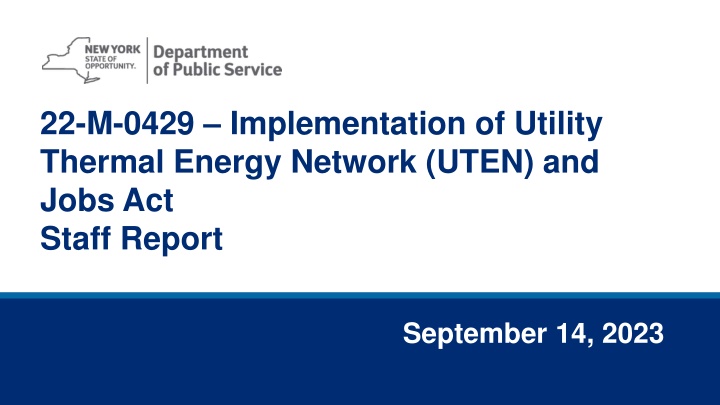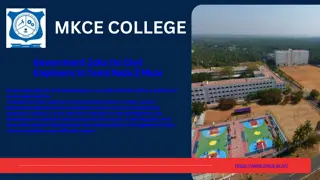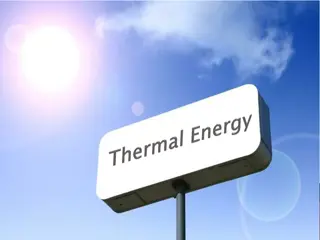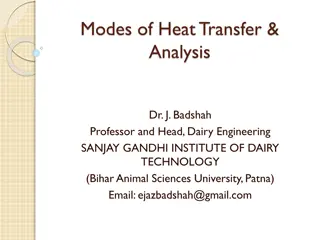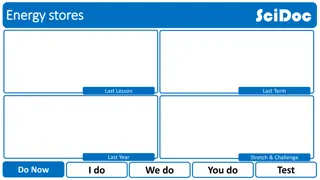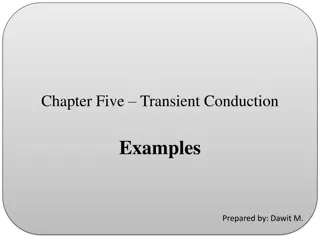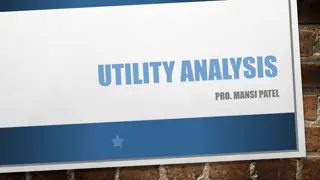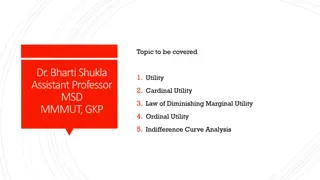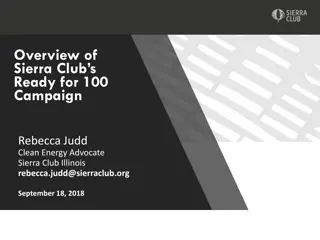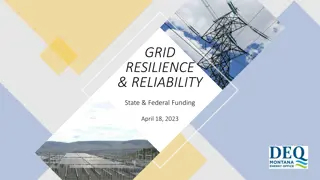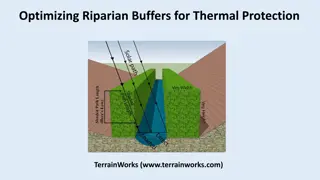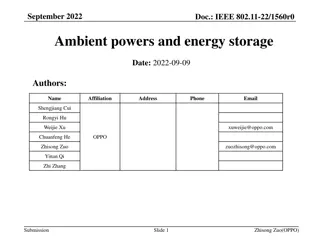Implementation of Utility Thermal Energy Network (UTEN) and Jobs Act Update
The implementation of the Utility Thermal Energy Network (UTEN) and Jobs Act involves a series of events and discussions, including the signing into law, technical conferences, pilot project proposals, and withdrawals. Various utilities have proposed pilot projects targeting different types of customers and thermal sources. The process involves considerations such as costs, ownership models, and permitting requirements, with a focus on providing thermal energy to diverse community sectors.
Download Presentation

Please find below an Image/Link to download the presentation.
The content on the website is provided AS IS for your information and personal use only. It may not be sold, licensed, or shared on other websites without obtaining consent from the author.If you encounter any issues during the download, it is possible that the publisher has removed the file from their server.
You are allowed to download the files provided on this website for personal or commercial use, subject to the condition that they are used lawfully. All files are the property of their respective owners.
The content on the website is provided AS IS for your information and personal use only. It may not be sold, licensed, or shared on other websites without obtaining consent from the author.
E N D
Presentation Transcript
22-M-0429 Implementation of Utility Thermal Energy Network (UTEN) and Jobs Act Staff Report September 14, 2023
2 Timeline To-Date July 2022 Utility Thermal Energy Network and Jobs Act Signed into law September 2022 - Initiating Order October 2022 Utility Initial Filings December 2022 Technical Conference Held January 2023 Utility Pilot Project Proposal Filings April 2023 Initial Comments Submitted May, June, August 2023 Supplemental Filings, Pilot Project Withdrawals and Additional Comments September 2023 Staff UTEN Report and Guidance Order
3 Technical Conference December 1, 2022 - Staff convened a technical conference In-person and virtual to maximize participation Over 180 attendees Well attended with stakeholders from utilities, NYSERDA, engineering firms, industry and advocacy groups, and Commissioner Burman Utilities and NYSERDA presented proposed pilots and research efforts
4 Technical Conference, con t. Topics discussed Available subsidies/incentives Costs Recovery from Electric and/or Gas customers Retrofit vs new installation costs Standalone geothermal vs UTEN Design considerations and potential costs Varying ownership models, public/private Availability of contractor resources DEC permitting for wells greater than 500-feet deep
5 Summary of Proposals In January 2023, the seven utilities proposed 14 pilot projects with estimated total costs of $360-$435 million and 1-2-year timeframes from approval to construction. 10 are in Disadvantaged Communities The proposals varied in their level of detail, but none were complete Con Edison, O&R, and Central Hudson filed supplemental information in May and June 2023 Supplemental filings had additional public comment periods NFG withdrew its pilot due to final feasibility study findings and stated it will conduct RFI process and submit new filing by December 1, 2023 KEDLI/LIPA withdrew filed pilot due to significant uncertainties regarding the viability of the project, and stated they will submit new filing by December 1, 2023
6 Summary of Proposals, con t. Customers providing heat to system Community youth center, data center, large office building, grocery store, municipal-owned borefield Customers receiving heat from system Municipal buildings, old and new construction, small and large residential, commercial Targeting areas with leak-prone gas pipe UTENs ownership split between large private or municipal customers Diverse thermal sources Wastewater Treatment Plant Lake/River Shallow closed loop boreholes Surface water heat exchanger
7 Summary of Comments The Joint Environmental Commenters see that most utilities are proposing promising and innovative projects but recommends the Commission delay approval of projects until commenters questions are answered and more detailed proposals are submitted. The Joint Environmental Commenters want the Commission to solicit more pilots and feasibility studies. A few Commenters suggested the Commission impose cost controls and moderate cost impacts to consumers by using a longer amortization period, pegged to the usage life of the equipment, to further minimize bill impacts. A few Commenters oppose the use of fossil-fuel or any other non-zero emission thermal resources for primary, secondary, or supplemental heating or cooling. Several Commenters emphasized the need for community engagement because efforts already taken were insufficient. They suggested establishing a community advisory committee to help facilitate communication between the utility and community. Labor Unions recommend the Commission emphasize the use of Project Labor Agreements and draft regulations on labor requirements.
8 Summary of Comments, con t. Commenters also suggest the Commission establish a standard or uniform depreciation approach, as well as standard accounting practices, and standard data acquisition and management protocol. Additionally, Commenters noted that data should be available in an open-source fashion. The Joint Environmental Commenters and HEET include proposed examples of required data and data acquisition efforts NRDC proposes a metric comparing UTEN cost and efficacy with that of air source heat pumps. Utility-specific comments: Con Edison Approximately a dozen comments supporting Con Edison s pilot portfolio. NYC and NYCHA support Con Edison s Chelsea project. However, NYC does not support Con Edison s Rockefeller Center project and takes issue with Con Edison s overall projected cost. KEDNY 500+ form letter comments opposing KEDNY s Vandalia pilot due to lack of cooling. NYC supports the pilot even if it will only provide heating. KEDNY responded stating that it intends for the pilot to include cooling in some form. KEDNY proposed versions with heating only or with heating and cooling, at a greater expense. Commenters support NYSEG s Ithaca pilot and suggested other utilities model their systems after NYSEG s loop design. Central Hudson - The Joint Environmental Commenters appreciate the level of detail the Company included in its Supplemental Plan, and generally support the Commission approving ratepayer funds to develop and construct the project.
9 Lessons Learned and Market Barriers No pilot project proposal included enough detail for Commission authorization Different types of UTEN designs Best fit for varying types of customers Ambient versus higher temperature Varying temperatures impact needed equipment for utility/customer The supply and demand of thermal energy from diverse building loads of the connected customers and thermal sources must be considered to balance a system overall The dynamic nature of the systems create complexities and lead to a balancing act of enrolling customers and developing projects UTENs across the world commonly use combustion for part of thermal heat input. Inconsistent with goals of CLCPA.
10 Lessons Learned and Market Barriers, con t. Education Terms and definitions Primary, Secondary, Emergency, Backup, Supplemental, Hybrid, etc. Lack of technical/operational standards Safety, Reliability, Resiliency Performance metrics to assist in promulgation of industry rules Cost Recovery, Tracking of Costs, and Rate design Design of systems that utilize waste heat from one customer to serve others Contractor/Drilling resources DEC permitting for wells greater than 500-feet deep
11 Draft Order Providing Guidance on Development of Utility Thermal Energy Network Pilot Projects
12 Phased Implementation Approach Pilot Project Stages 1.Pilot Project Scope, Feasibility, and Stakeholder Engagement 2.Pilot Project Engineering Design and Customer Protection Plan 3.Customer Enrollment and Pilot Project Construction 4.Pilot Project Operation and Management 5.Pilot Project Review, Recommendations, and Conclusion
13 Pilot Project Stages and Timeline Stage 2 Pilot Project Engineering Design and Customer Protection Plan Stage 1 Pilot Project Scope, Feasibility, and Stakeholder Engagement Stage 3 Customer Enrollment and Pilot Project Construction Stage 1 Initial Pilot Project Proposals Filed Stage 4 Pilot Project Operation and Management Stage 5 Pilot Project Review, Recommendations, and Conclusion Order Authorizing Customer Enrollment and Pilot Project Construction September 2023 Guidance Order Staff Letter Confirming Compliance Advancement of Pilot Project to Stage 3 through project- specific Commission Order(s). Utilities file Final UTEN Pilot Project Engineering Design and Customer Protection Plans. Filings will be issued for public comment. Order will finalize pilot project operational requirements, cost recovery, CPPs, performance monitoring and reporting structure. Pilot project will be operational for a minimum of 5 years. Individual pilot project decisions will be provided beginning at Stage 2. Staff issues letter confirming compliance with Guidance Order and advances project(s) to Stage 2 or notes deficiencies to be addressed. Utilities file Final Engineering Design and Customer Protection Plans for each pilot project within 9 months of Staff letter. All pilot project proposals are currently in Stage 1. Initial Pilot Project Proposals filed on January 9, 2023. Guidance Order provides clarifications, establishes stage-gate approach, and identifies additional information needed to advance projects to next stage. Utilities file Final UTEN Pilot Project Proposals by December 15, 2023.
14 Guidance Order Actions Key Terms & Definitions - Staff is directed to convene a Technical Conference within 30 days to develop mutually agreed upon terms and definitions for use in this and other Commission proceedings related to UTENs. Staff will file the Terms and Definitions with the Secretary. Performance Metrics Establishes Four Categories: 1) Technical; 2) Financial; 3) Customer or Societal; and 4) Safety and Reliability. Staff is directed to convene one or more Technical Conferences before March 31, 2024. Following Technical Conference(s) Staff will file with the Secretary summary of Technical Conferences and agreed upon metrics. Performance & Expenditures Reports Utilities are directed to file monthly Progress & Expenditure Reports starting November 15, 2023.
15 Further Guidance Provided in the Following Areas: Clarification on UTEN Design Options Diversity of Pilot Projects Disadvantaged Communities Technical, Economic and Operational Aspects o UTEN Optimization and Balancing o Thermal Energy Resources o Safety, Reliability, and Resiliency o On-site Energy Efficiency Upgrades o Comparative Analysis of UTEN Systems vs Individual Electrification Customer Protection Plans Labor Requirements
